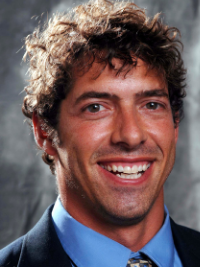Eric W. Montie, MS, PhD
Associate Professor of Biology
Department of Natural Sciences

I am the Director of the Marine Sensory and Neurobiology Lab and The Lowcountry Dolphin Conservation Program at USCB. I earned a BS in Zoology at the University of Rhode Island in 1993, and then embarked upon post-baccalaureate studies in Biochemistry at Harvard University. I received a MS degree in Environmental Toxicology at Clemson University in 1999, then worked from 1999 to 2000 as a marine mammal field biologist at the National Ocean Service in Charleston, SC. I completed my PhD in September 2006 in the Massachusetts Institute of Technology / Woods Hole Oceanographic Institution Joint Program in Biological Oceanography. I accepted a faculty position at the University of South Carolina Beaufort in 2011, where I now am an Associate Professor in the Department of Natural Sciences. I also serve as a primary advisor for graduate students interested in combining marine ecology, bioacoustics, and computational science through the USCB Computational Science Master’s Program. In 2013, I was selected as a Breakthrough Rising Star (15 selected of 2000 faculty throughout the USC System). In May 2021, I was the recipient of the Governor’s Award for Excellence in Scientific Research at a Predominately Undergraduate Institution.
My research program focuses on fish and marine mammal biology and the bioacoustics of marine life with applied applications in environmental toxicology, noise pollution and climate change. My team utilizes passive acoustic recorders mounted on oceanographic instrument frames that allow continuous and long-term sampling of the underwater soundscape. These recordings provide information on the behavior of snapping shrimp, spawning patterns of fish, foraging patterns and communication of bottlenose dolphins and noise levels associated with human activity. The long-term goal is to ‘eavesdrop’ on key behaviors of marine animals that can change rapidly or gradually in response to environmental changes and human impacts, thus providing a measure of resilience or shifting baselines in a globally changing environment. In 2020, I founded the Estuarine Soundscape Observatory Network in the Southeast (or ESONS), which now monitors biological sound and human-made noise in four estuaries of South Carolina. In addition, I supervise the Lowcountry Dolphin Conservation Program, which focuses on the population dynamics and ecology of common bottlenose dolphins in the Port Royal Sound Area.
- Education
- Teaching
- Research
MS in Environmental Toxicology, Clemson University (1999)
PhD in Biological Oceanography, MIT/WHOI Joint Program (2006)
- B102 Biological Principles II
- B295 Directed Studies in Biology
- B395 Advanced Directed Studies Biology
- B435 Neurobiology
- B435L Neurobiology Laboratory
- B436 Ichthyology
- B438 Marine Mammal Biology
- B438L Marine Mammal Biology Lab
- B499 Topics in Biology
- Acoustic communication of marine life
- Soundscape ecology
- Fish and bottlenose dolphin population monitoring
- Impacts of stressor on marine organisms and ecosystems
- Noise pollution
- Environmental toxicology
- Climate change